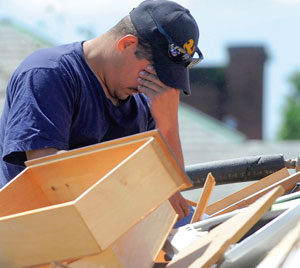CHARLENEM
“O people, keep your duty to your Lord; surely the Shock of the Hour is a grievous thing. The day you see it, every woman giving suck will forget her suckling and every pregnant one will lay down her burden, and thou wilt see men as drunken, yet they will not be drunken, but the chastisement of Allah will be severe.” –Holy Qur’an, Chapter 22, Verse 2

(FinalCall.com) – Severe natural disasters have been curtailing America on all sides and as volunteer workers scramble to help survivors pick up the pieces to lives and property swept away in tornados, snowstorms and hurricanes, they are working to help people maintain their mental health, heavily tested by the unprecedented events.
Millions of dollars in recovery efforts have been spent to help feed and shelter survivors but another key area of need is help dealing with the psychological toll disasters have taken on American citizens, according to mental and social health experts.
“In a number of cases, people are coming to the realization that they are homeless and there is a lot of doubt, feelings of despair and anger that hits one’s self-worth,” especially if one’s neighbors have received help and they hit road blocks, said E.C. Bell, director of Metro Counseling Center, a non-profit substance program in Jackson, Miss., and a member of the Association of Black Social Workers.
On June 11 Massachusetts Governor Deval Patrick sought federal funding for recovery after a pair of tornados tore through parts of the state on June 1. In Arizona, weather attacks began in May via a 693-square mile raging wildfire that is now threatening New Mexico.
The latest disasters have given relief efforts little time to regroup since a snowstorm paralyzed the Midwest in January, tornados hit the South in April, and the Midwest came under attack again by tornados in May.
Survivors need trained volunteers, well-versed in community-based approaches to psychological support, disaster professionals say. Such approaches build on local resources, focus on strengthening community networks by utilizing its members knowledge, values and methods to enhance appropriate responses, according to the International Federation of Red Cross and Red Crescent Societies.
People who have experienced natural weather disasters sometimes view themselves as victims, which fosters feelings of helplessness, a loss of self-esteem, and self-blame, despite things being out of their control, according to Mr. Bell.
Counseling is a way to help ease some of the psychological impact because most people want to talk about their situation so just being a good listener and giving them a chance to vent will help them, and whether the disaster occurred yesterday or years ago, recovery can last a lifetime, especially mentally,” Mr. Bell told The Final Call.
According to Ebony Muhammad, a certified thanatologist specializing in grief and loss, disasters leave people with few remnants of the life they had before.News visuals show families hunting for photo albums and other sentimental items that connect them to their memories because thoseitems comfort them and help to combat the trauma.Many people self-medicate to cope, she said.
The Most Honorable Elijah Muhammad and the Honorable Minister Louis Farrakhan have and continue to give means of preparation for disasters–first pointing to scripture where these natural disasters have taken place and are prophesied to take place.
Both have written and spoken countless times on the subject and have said to us to watch the weather, because the Four GreatJudgments(rain, hail, snow, and earthquakes) are coming to us, noted Ms. Muhammad.
It’s time we take their words seriously. It’s a matter of life and death, she said.
The National Children’s Advocacy Center in Huntsville, Ala., offers therapeutic services mainly to child victims of family-related or sexual trauma but has received increased calls from schools wanting to know how to help frightened children since the tornados, according to Catherine Hereford, director of development for the center.
“What we’re seeing is a higher rate of children who have stronger reactions to storms, feelings of anxiety, fear and worry about the safety of themselves and others,” she said. In addition, children have shown changes in behavior like increased irritability, withdrawal, angry outbursts and aggression, increased sensitivity to sounds, loss of interest in activities and regressive behaviors, like going back to baby talk and bed wetting.
“The question of resolution to the psychological impact of natural disasters is therefore a question going beyond recovery, and unfortunately that becomes a physical phenomenon in terms of repairing buildings, roads and broken bones.We have to go beyond the question ofrestoration to how do we restore people’s sense of spirit,” according to Dr. Wade Noble, a member of the Association of Black Psychologists’ Haiti Disaster Relief Task Force.
The Honorable Minister Louis Farrakhan, however, has warned that the divine chastisement and death that have entered America are harbingers of difficult times ahead. He has also warned that the place to seek refuge is with God, and in living the life that God wants lived. The Minister has stressed the need for disaster preparedness for the Black community as the intensity and scope of disasters continues to increase. He has called for widespread training and coordination of efforts in the Black community in this dangerous time.












